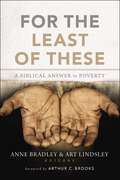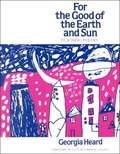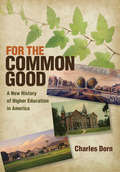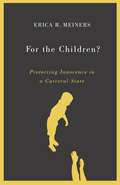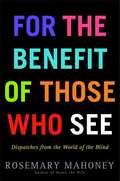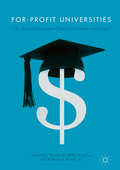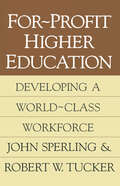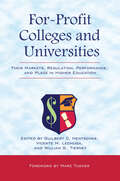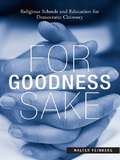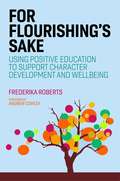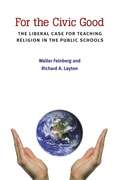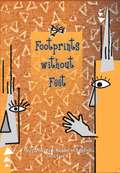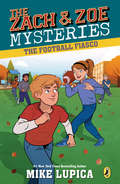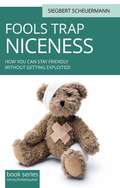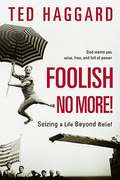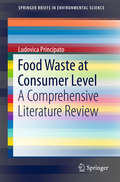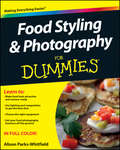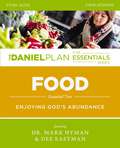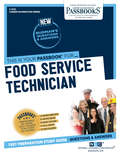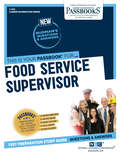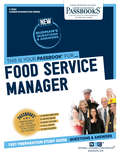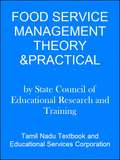- Table View
- List View
For the Least of These: A Biblical Answer to Poverty
by Arthur C. Brooks Anne R. Bradley Arthur W. LindsleyToday, many thoughtful and compassionate Christians are addressing the challenge of alleviating poverty. But while much progress has been made, many well-intentioned efforts have led Christians to actions that are not only ineffective, but leave the most vulnerable in a worse situation than before. Is there a better answer?Combining biblical exegesis with proven economic principles, For the Least of These: A Biblical Answer to Poverty equips Christians with both a solid biblical and economic understanding of how best to care for the poor and foster sustainable economic development. With contributions from fifteen leading Christian economists, theologians, historians, and practitioners, it presents the case for why a multi-faceted approach is needed, and why a renewed focus on markets and trade are the world’s best hope for alleviating poverty and serving those in financial need.
For the Good of the Earth and Sun: Teaching Poetry
by Georgia Heard Lucy Mccormick-CalkinsThe principles of teaching poetry discussed are applicable to any classroom of student poets, regardless of age.
For the Common Good: A New History of Higher Education in America (American Institutions and Society)
by Charles DornAre colleges and universities in a period of unprecedented disruption? Is a bachelor's degree still worth the investment? Are the humanities coming to an end? What, exactly, is higher education good for?In For the Common Good, Charles Dorn challenges the rhetoric of America’s so-called crisis in higher education by investigating two centuries of college and university history. From the community college to the elite research university—in states from California to Maine—Dorn engages a fundamental question confronted by higher education institutions ever since the nation’s founding: Do colleges and universities contribute to the common good?Tracking changes in the prevailing social ethos between the late eighteenth and early twenty-first centuries, Dorn illustrates the ways in which civic-mindedness, practicality, commercialism, and affluence influenced higher education’s dedication to the public good. Each ethos, long a part of American history and tradition, came to predominate over the others during one of the four chronological periods examined in the book, informing the character of institutional debates and telling the definitive story of its time. For the Common Good demonstrates how two hundred years of political, economic, and social change prompted transformation among colleges and universities—including the establishment of entirely new kinds of institutions—and refashioned higher education in the United States over time in essential and often vibrant ways.
For the Children?: Protecting Innocence in a Carceral State
by Erica R. Meiners"Childhood has never been available to all." In her opening chapter of For the Children?, Erica R. Meiners stakes the claim that childhood is a racial category often unavailable to communities of color. According to Meiners, this is glaringly evident in the U.S. criminal justice system, where the differentiation between child and adult often equates to access to stark disparities. And what is constructed as child protection often does not benefit many young people or their communities. Placing the child at the heart of the targeted criminalization debate, For the Children? considers how perceptions of innocence, the safe child, and the future operate in service of the prison industrial complex.The United States has the largest prison population in the world, with incarceration and policing being key economic tools to maintain white supremacist ideologies. Meiners examines the school-to-prison pipeline and the broader prison industrial complex in the United States, arguing that unpacking child protection is vital to reducing the nation's reliance on its criminal justice system as well as building authentic modes of public safety. Rethinking the meanings and beliefs attached to the child represent a significant and intimate thread of the work to dismantle facets of the U.S. carceral state. Taking an interdisciplinary approach and building from a scholarly and activist platform, For the Children? engages fresh questions in the struggle to build sustainable and flourishing worlds without prisons.
For the Benefit of Those Who See: Dispatches from The World of the Blind
by Rosemary Mahoney"In this intelligent and humane book, Rosemary Mahoney writes of people who are blind .... She reports on their courage and gives voice, time and again, to their miraculous dignity. " --Andrew Solomon, author of Far From the Tree *** In the tradition of Oliver Sacks's The Island of the Colorblind, Rosemary Mahoney tells the story of Braille Without Borders, the first school for the blind in Tibet, and of Sabriye Tenberken, the remarkable blind woman who founded the school. Fascinated and impressed by what she learned from the blind children of Tibet, Mahoney was moved to investigate further the cultural history of blindness. As part of her research, she spent three months teaching at Tenberken's international training center for blind adults in Kerala, India, an experience that reveals both the shocking oppression endured by the world's blind, as well as their great resilience, integrity, ingenuity, and strength. By living among the blind, Rosemary Mahoney enables us to see them in fascinating close up, revealing their particular "quality of ease that seems to broadcast a fundamental connection to the world. " Having read FOR THE BENEFIT OF THOSE WHO SEE, you will never see the world in quite the same way again.
For-Profit Universities
by Tressie Mcmillan Cottom William A. Darity Jr.This edited volume proposes that the phenomenon of private sector, financialized higher education expansion in the United States benefits from a range of theoretical and methodological treatments. Social scientists, policy analysts, researchers, and for-profit sector leaders discuss how and to what ends for-profit colleges are a functional social good. The chapters include discussions of inequality, stratification, and legitimacy, differing greatly from other work on for-profit colleges in three ways: First, this volume moves beyond rational choice explanations of for-profit expansion to include critical theoretical work. Second, it deals with the nuances of race, class, and gender in ways absent from other research. Finally, the book's interdisciplinary focus is uniquely equipped to deal with the complexity of high-cost, low-status, for-profit credentialism at a scale never before seen.
For-profit Higher Education: Developing a World Class Workforce
by John SperlingToday a college degree is needed to ensure an avenue to a decent standard of living. The workplace demands lifelong learning, since most workers will change careers several times before retiring. Meanwhile, attaining a degree is becoming more difficult both in terms of the time required and money. This affects not only individuals but encourages lawmakers to seek alternatives. This book examines higher education programs designed for and delivered to working adult students under a unique for-profit model, one that benefits both taxpayer and student.
For-Profit Colleges and Universities: Their Markets, Regulation, Performance, and Place in Higher Education
by Guilbert C. Hentschke Vicente M. Lechuga William G. TierneyDo for-profit colleges and universities (FPCUs) pose a threat to traditional providers of higher education, or do they play a vital role at a time when the capacity of public and private non-profits to meet demand is constrained? With the US no longer the leader in developing a college-educated workforce, can FPCUs help redress the competitive gap? What can be learned from the management practices and growth of FPCUs – that now number close to 3,000 institutions in the US – whose increase in enrollments has out-paced that of traditional institutions, and who now grant around 8% of all degrees? This book offers a clear-eyed and balanced analysis of for-profit colleges and universities, reviewing their history, business strategies, and management practices; setting them in the context of marketplace conditions, the framework of public policy and government regulations; and viewing them in the light of the public good.Individual chapters variously explore FPCU’s governance, how they develop courses and programs, and the way they define faculty work; present findings from in-depth interviews with part-time and full-time faculty to understand how external forces and the imperative of profit generation affect faculty roles and responsibilities of faculty; analyze policy considerations that affect FPCUs, including federal regulation and oversight, accountability and assessment, and the legal and regulatory issues FPCUs face internationally; and finally address the notion of academic freedom and the distribution of public monies to FPCUs. Looking beyond FPCUs’ current strategy of offering career programming to non-traditional students, the book reveals how they are positioning themselves to meet future market needs by developing new programs targeting a wider group of students.Recognizing that FPCUs are more developing than fully developed, the authors convey both the current state and the unresolved issues facing these businesses, and, in so doing, surface enduring topics that face all of post-secondary education.
For Keeps
by Natasha FriendJosie's never met her dad, and that's fine with her. To Josie, Paul Tucci is just a guy who got her mom pregnant and then moved away. It all happened sixteen years ago, when Josie's mom was still a teenager herself. But now Paul Tucci is back in town, and Josie has to deal with not one but two men in her life her father and her first boyfriend, who Josie fears will hurt her just like Paul hurt her mother.
For Goodness Sake: Religious Schools and Education for Democratic Citizenry
by Walter FeinbergWhile the fierce debate over religion in public schools receives ample media attention, we rarely consider the implications of religious schools on moral education and liberal democracy. In this groundbreaking work, Walter Feinberg opens up a critical new dialogue to offer a complete discussion of the important role religious schools play in the formation of a democratic citizenry. Feinberg, a leading philosopher of education, approaches the subject of religious education with a rare evenhandedness, drawing on examples from Christian, Jewish, and Muslim schools and exploring topics as disparate as sex education and creationism. For Goodness Sake provides a much-needed take on a controversial topic, demonstrating that the relationship between religion and schooling is not simply the exclusive concern of members of a given religious community, but a relevant and vital issue for everyone who cares about education.
For Flourishing's Sake: Using Positive Education to Support Character Development and Well-being
by Frederika RobertsPositive and character education are increasingly recognised as providing valuable ways for schools to improve the individual and social development and academic attainment of all students. Introducing new approaches for whole school implementation can be a daunting task as all aspects of school life can be affected by adopting a new philosophy.Frederika Roberts provides clear thinking, guidance and inspiration to help you introduce enhance or expand positive education in your school. Drawing on interviews with pioneering school leaders and teachers from across the globe, Roberts weaves real life examples with research backed expert advice on all aspects of integrating character education in schools, including chapters on cultural context, leadership, and staff training. This empowering, strengths-based book is a friendly companion providing the encouragement you need, along with a healthy dose of practical ideas, to help your school and each individual in its community to flourish.
For The Civic Good: The Liberal Case For Teaching Religion In The Public Schools
by Walter Feinberg Richard A. LaytonWhy teach about religion in public schools? What educational value can such courses potentially have for students? In For the Civic Good, Walter Feinberg and Richard A. Layton offer an argument for the contribution of Bible and world religion electives. The authors argue that such courses can, if taught properly, promote an essential aim of public education: the construction of a civic public, where strangers engage with one another in building a common future. The humanities serve to awaken students to the significance of interpretive and analytic skills, and religion and Bible courses have the potential to add a reflective element to these skills. In so doing, students awaken to the fact of their own interpretive framework and how it influences their understanding of texts and practices. The argument of the book is developed by reports on the authors’ field research, a two-year period in which they observed religion courses taught in various public high schools throughout the country, from the “Bible Belt” to the suburban parkway. They document the problems in teaching religion courses in an educationally appropriate way, but also illustrate the argument for a humanities-based approach to religion by providing real classroom models of religion courses that advance the skills critical to the development of a civic public.
Footprints Without Feet class 10 - NCERT
by National Council of Educational Research and TrainingThis book prescribed by central board of secondary education, India for the students of class 10th subject Supplementary English This accessible version of the book doesn't leave any part of the book. The book is handy companion of the school going students.
The Football Fiasco (Zach and Zoe Mysteries, The #3)
by Mike LupicaThe third installment of the Zach and Zoe Mysteries--a sports-themed chapter book mystery series by New York Times bestselling author Mike Lupica.There's nothing eight-year-old twins Zach and Zoe Walker love more than playing sports and solving mysteries. And when those two worlds collide . . . well, it doesn't get any better than that. In their third mystery, Zach and Zoe discover their recess football has been completely deflated, leaving them without a ball to play with. But who's behind it? By searching for clues around the school, Zach and Zoe uncover the truth behind the damaged ball, and learn the importance of friendship, inclusion, and being conscious of other people's feelings. Ending with a big Walker Family Thanksgiving Turkey Bowl game, The Football Fiasco is the perfect fall chapter book!In the opening installments of the Zach and Zoe Mysteries, bestselling author Mike Lupica begins a series for a new and younger audience, introducing readers to a sports-loving detective duo who can swing for the fences and catch the culprit in one fell swoop. With a recipe equal parts sports and mystery, the Zach and Zoe Mysteries break fresh ground for an author who has been called the greatest sportswriter for kids.
Fool's Trap Niceness: How you can stay friendly without being exploited
by Siegbert Scheuermann"Fool's Trap Niceness: How you can stay friendly without being exploited" We learn from an early age to be polite and nice to others. Many of us have been tricked by the environment into turning the other cheek rather than defending ourselves against impertinence. And that in a dispute the wiser one gives in until he is finally the stupid one. We should however in our own interest - be both friendly and fortified, - be helpful, but also be able to say no, - be open for others but also take our own needs seriously, register, and try to enforce them. "Fool's Trap Niceness" is a guidebook for all "nice" people, who don't say or say too seldom, when they are disturbed by something. - neither at home to the partner, the friends, acquaintances or the children, -and still at work with colleagues, the boss or their own customers or employees. Those who prefer to "clench their fist in their pockets" and get angry with a stomach ulcer instead of saying in a friendly and determined manner: "Not like this!" Here you will find a source of ideas and a helper if you don't want to be undercut and exploited in the future. The brevier "Fool's Trap Niceness" provides you with background information as to why "Nice is the little sister of Sh*t", why a healthy and far-sighted egoism is better and more beneficial for all involved in the long run. In addition, the concrete examples and discussion guides will help you to practically implement the demonstrably most successful strategies in the world. The content has been developed from personal experience and the work of 25 years in behavioral and communication training with thousands of participants. Basis are the articles of the author in the Blog: www.hirnschrittmacher.eu Translated with www.DeepL.com/Translator
Foolish No More!: Seizing A Life Beyond Belief
by Ted HaggardHow a 2,000-year-old letter can revolutionize your life. The Apostle Paul was a wise saint who often revealed a crusty attitude–especially when the truth of the gospel was under attack. So when he penned his letter to his “dear children” in the faith–the Galatians–his frustration over their warped thinking had him about to blow his top. Though he tried to restrain himself, he couldn’t help but call them “foolish”! Paul simply could not understand how any follower of Christ, adopted by faith into the most free and exciting life possible, could want to go back to the old way of bondage to rules and regulations. You’d think by now, two thousand years later, things would have changed. But even today Christians just can’t seem to “get” the revolutionary message of spiritual freedom and power advocated in the book of Galatians. InFoolish No More!Ted Haggard, senior pastor of New Life Church in Colorado Springs and president of the National Association of Evangelicals, retraces Paul’s arguments to make the clear case for breathtaking freedom in Christ. So wise up! Discover how to put off the old ways and walk in the Spirit, enjoy freedom in Christ, and wield the power of God on behalf of His Kingdom.
Food Waste at Consumer Level: A Comprehensive Literature Review (SpringerBriefs in Environmental Science)
by Ludovica PrincipatoThis book presents what is the state-of-the-art in the field of the food waste phenomenon at consumer level, including a thorough literature review, and it highlights trends in the field. It provides a comprehensive starting point for future research. Food waste represents a major public policy issue, which is included in the UN Sustainable Development Goals. In this context, the present work identifies the most important definitions given to food waste and its environmental, social and economic impacts. With a comprehensive literature review that covers a forty-year time span (1977-2017), this book highlights the multiple, complex facets of food waste at the consumer level. Drawing from behavioural and marketing theories, it proposes a new theoretical framework with the aim to better explain food waste behaviour. Extensive research is being carried out on the main worldwide initiatives (both public and private) and food policies aimed at tackling the phenomenon.
Food Styling & Photography For Dummies
by Alison Parks-WhitfieldDiscover how to style and photograph food like the pros Whether you're taking shots for a foodie blog, advertisements, packaging, menus, or cookbooks, Food Styling & Photography For Dummies shows you how to take the next step in your passion for food and photography. This attractive, informative, and fun guide to the fundamentals of food styling provides information on the tools and techniques used by some of the most successful industry professionals. Food Styling & Photography For Dummies provides you with the fundamentals of food styling and gives you the inside scoop on the tools and techniques used by some of the most successful industry professionals. Shows you how to translate taste, aroma, and appeal through color, texture, and portion Includes techniques such as extreme close-ups, selective focus, and unique angles to create dramatic effect Detailed coverage on lighting and composition Tips for choosing the proper equipment and mastering the use of camera settings, lenses, and post-production software Advice for creating a professional personality and getting your food photography business off the ground Whether you're an amateur or professional food photographer, Food Styling & Photography For Dummies is a fun and informative guide to photographing and arranging culinary subject matter.
Food Styling for Photographers: A Guide to Creating Your Own Appetizing Art
by Linda Bellingham Jean Ann Bybee"You eat with your eyes first," and no one turns a photograph of food into a culinary masterpiece like a food stylist. Food Styling for Photographers is the next best thing to having renowned food stylist Linda Bellingham by your side. Linda has worked with clients Baskin Robbins Ice Cream, McDonald's, Tyson Foods, FritoLay, and many, many more. Professional photographer Jean Ann Bybee has worked with Harry & David, Dominos, Sara Lee, Seven-Up Company, and more. Jean Ann provides a seasoned photographer's point of view with helpful tips throughout.If you are hungry for unique photo assignments and want to expand your portfolio, this guide provides the well-kept secrets of food styling techniques that can make your photos good enough to eat. Each chapter covers step-by-step instructions with mouth-watering photographs illustrating techniques for the creation of hero products that photographers at any level can whip up. Bon Appétit!
Food Study Guide: Enjoying God's Abundance (The Daniel Plan Essentials Series)
by Dr. Mark Hyman Dee EastmanIn this four-session video-based Bible study (DVD/digital video sold separately), The Daniel Plan team explores both the spiritual and the health benefits of following a healthy lifestyle by focusing on the second essential of The Daniel Plan: Food.The sessions include:Learning to Live AbundantlyJumpstart Your HealthCravings, Comfort Food, and ChoicesDesigning Your Eating LifeEach session will highlight testimony from those who have incorporated The Daniel Plan into their everyday lifestyle, plus tips on getting started and medically based information on maintaining a healthy lifestyle by following The Daniel Plan. Each of the other DVD/Study Guides will focus on another essential: Faith, Fitness, Focus, and Friends.Designed for use with the Food Video Study (sold separately).
Food Service Technician: Passbooks Study Guide (Career Examination Series)
by National Learning CorporationThe Food Service Technician Passbook® prepares you for your test by allowing you to take practice exams in the subjects you need to study. It provides hundreds of questions and answers in the areas that will likely be covered on your upcoming exam, including but not limited to: cleaning and maintaining food service areas; operation and maintenance of machinery; oral communication; record keeping; and more.
Food Service Supervisor: Passbooks Study Guide (Career Examination Series #C-1411)
by National Learning CorporationThe Food Service Supervisor Passbook® prepares you for your test by allowing you to take practice exams in the subjects you need to study. It provides hundreds of questions and answers in the areas that will likely be covered on your upcoming exam.
Food Service Manager: Passbooks Study Guide (Career Examination Series)
by National Learning CorporationThe Food Service Manager Passbook® prepares you for your test by allowing you to take practice exams in the subjects you need to study. It provides hundreds of questions and answers in the areas that will likely be covered on your upcoming exam, including but not limited to: food service management principles and practices; basic nutrition and dietetics; proper food preparation and serving techniques; sanitary food handling and storage practices; purchising; supervision and training; and other related areas.
Food Service Management Theory and Practical class 12 - Tamil Nadu Board
by State Council of Educational Research TrainingThe units in the book deals with managerial aspects like organisation and tools of management and aspects related to quantity food production, service procedures, food and beverage management and food safety and quality, personnel management, marketing and entrepreneurial skills. The pedagogical features in this book are framed in such a way that it would help students and teachers to maximise the value of this text. Each chapter begins with the learning objectives and the concepts are supported with flow diagrams, tables and pictures to enable a complete learning. Do you know? Glossary, Multiple Choice Questions, Question answers are added to aid in preparation of examination and learning. Glossary explains some of the terms dealt in the topics to enable understanding. Teacher and Student activity helps the students analyse and discuss real-time problems with peer groups and mentors. Technological insights are included to give insight to students about how the food service industry is advancing as per times. Technologies insights namely QR Code, you-tube linkages makes learning more interesting and provides a digital access of the topics.
Food Service Management Theory and Practical class 12 - Tamil Nadu Board
by State Council of Educational Research TrainingThe units in the book deals with managerial aspects like organisation and tools of management and aspects related to quantity food production, service procedures, food and beverage management and food safety and quality, personnel management, marketing and entrepreneurial skills. The pedagogical features in this book are framed in such a way that it would help students and teachers to maximise the value of this text. Each chapter begins with the learning objectives and the concepts are supported with flow diagrams, tables and pictures to enable a complete learning. Do you know? Glossary, Multiple Choice Questions, Question answers are added to aid in preparation of examination and learning. Glossary explains some of the terms dealt in the topics to enable understanding. Teacher and Student activity helps the students analyse and discuss real-time problems with peer groups and mentors. Technological insights are included to give insight to students about how the food service industry is advancing as per times. Technologies insights namely QR Code, you-tube linkages makes learning more interesting and provides a digital access of the topics.
